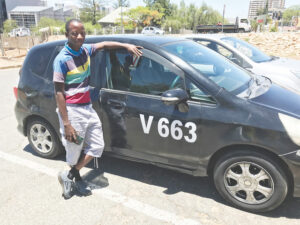[ad_1]
THE two splinter groups of the Ovaherero Traditional Authority will now take their battle for recognition to the Ministry of Urban and Rural Development, where minister Erastus Uutoni will decide on which clique the government recognises.
This follows the election of academic Hoze Riruako as the paramount chief of the faction aligned to the chairperson of the Ovaherero Traditional Authority (OTA), Vipuira Kapuuo.
The weekend election now formally means there are now two leadership camps of the Ovaherero chieftainship in Namibia, one led by professor Mutjinde Katjiua and the other under Riruako.
The election took place over the weekend in Otjimbingwe.
The urban and rural development ministry’s executive director, Nghidinwa Daniel, yesterday told The Namibian that they are now waiting for the factions to submit their applications to be recognised as the chief of the traditional authority.
“The government will only pronounce itself once a formal application for designation of a chosen leader, with supporting documents has been submitted to it, as per the legally prescribed application format and guidelines for recognition,” said Nghidinwa.
Yesterday, Nghidinwa explained to The Namibian that they have nothing to do with the current process, which is still at the level of the community concerned.
“The process of choosing a traditional leader is by a community, as per its customary laws and traditions and is up to the community to first agree or elect its leader, as per its customary and traditional norms,” he said.
The government can also not prescribe to the community how they should elect their leaders.
“We will only continue to guide communities to always act in a manner that upholds and respects their customary laws and traditions and in the interest of peace and unity,” he said.
Riruako won by a landslide victory with over 195 votes while his opponents failed to garner more than 50 votes each. the opponents were prominent lawmakers, McHenry Venaani who got 41 votes and Mike Kavekotora (33).
Both Riruako and Venaani stood for the chieftaincy in 2014 against advocate Vekuii Rukoro, who won that election. Initially, the situation became tense, with some people questioning the eligibility of certain delegates. Groups gathered outside the conference hall and engaged in heated arguments.
‘A PROMISE TO UNITE’
During his short speech after the results were announced, Riruako said he will deal with the disunity head-on.
“I hear about the division in this community and I’m not afraid of it. It’s just you guys who are afraid of this division.
“Let’s not forget the people who worked for this community,” he said.
The election process stretched across 16 hours, ending in the early hours of yesterday morning.
During the senate’s session, the chief’s council of the Ovaherero Traditional Authority had to take several breaks to discuss numerous issues that had arisen during the authority’s meeting at Otjimbingwe on Saturday.
The issues included whether delegates from local authorities are allowed to vote in the election of a new paramount chief of the authority.
This came after a question about whether delegates from Otjiwarongo and Ruacana could vote.
Another point that needed to be ironed out was the lack of a quorum of delegates from each constituency. Each constituency should have 14 delegates, five of whom should vote. However, some constituencies only sent one or two delegates to the meeting.
The discussions included an unsuccessful attempt by supporters of Riruako to eliminate Venaani and Kavekotora as candidates, based on an argument that they are not members of the traditional authority.
The chieftaincy became vacant after Rukoro lost his battle against Covid-19 in June 2021.
Rukoro succeeded the erstwhile Ovaherero paramount chief, Kuaima Riruako, who succumbed to a long illness in June 2014.
On the other hand, another faction is under the leadership of Katjiua, the former secretary general of the traditional authority.
Katjiua’s chieftaincy is disputed by the faction asserting that his nomination and designation as Ovaherero chief was not procedural.
However, Katjiua has maintained that the Ovaherero Chiefs Council nominated, designated and elected him following an established process.
The two factions, one led by Katjiua and the other led by Kapuoo have taken each other to court regarding the chief’s appointment. This case is expected to be in court on 14 February this year.
DISPUTES, INFIGHTINGS
Nghidinwa said traditional authorities should realise that peaceful resolution of conflicts and unity at the level of communities is important “for the maintenance and consolidation of peace and unity at the national level in our country in general”.
The recently elected chairperson of the Council of Traditional Leaders, Immanuel |Gaseb, said he will pronounce himself on the disputes and infightings of the different traditional authorities today.
[ad_2]
Source link




